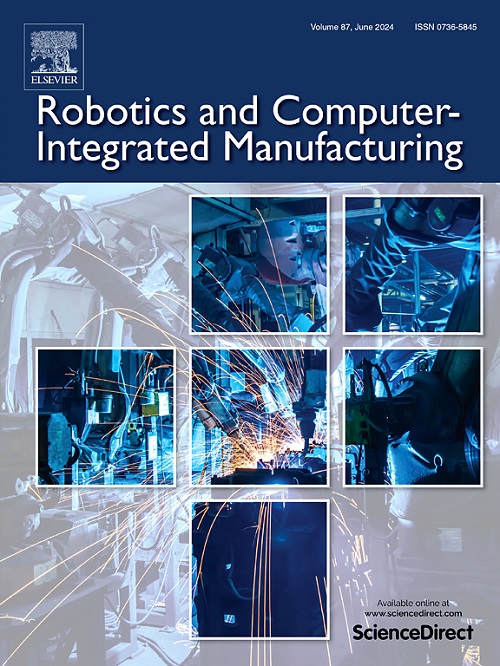Machine learning and deep learning applications in the automotive manufacturing industry: A systematic literature review and industry insights
IF 11.4
1区 计算机科学
Q1 COMPUTER SCIENCE, INTERDISCIPLINARY APPLICATIONS
引用次数: 0
Abstract
In the context of the automotive manufacturing industry, complexity and the extensive data generated during production pose significant challenges. With ongoing technological advancements, effectively harnessing and analyzing this data has become increasingly critical. Machine learning (ML) and deep learning (DL) have emerged as powerful tools to manage complexity and leverage data for enhanced decision-making and process optimization. This systematic literature review examines the application of ML and DL in automotive manufacturing, focusing on application domains, ML/DL model mapping, current trends, and effective implementation practices. Out of 2786 articles, 257 were analyzed, revealing key research areas: equipment optimization (31%), quality enhancement (26%), supply chain optimization (21%), and production efficiency (17%). Energy management was notably underrepresented (4%), indicating a significant opportunity for advancing energy efficiency and decarbonization efforts. Additionally, the review highlighted significant challenges in data management, including data quality, integration, and interoperability issues, which critically affect the successful deployment of ML and DL technologies. Insights from the review were shared with senior management at Toyota Motor Manufacturing France, aligning closely with their strategic vision for digital transformation. Successful implementation of ML and DL hinges on three essential pillars: standardization of manufacturing processes and data, robust IoT and big data infrastructure, and comprehensive human resource development. Embracing these pillars is crucial to navigating complexity, realizing AI’s full potential, and advancing efficiency, sustainability, and innovation in automotive manufacturing.
机器学习和深度学习在汽车制造业中的应用:系统的文献综述和行业见解
在汽车制造业的背景下,生产过程中产生的复杂性和大量数据构成了重大挑战。随着技术的不断进步,有效地利用和分析这些数据变得越来越重要。机器学习(ML)和深度学习(DL)已经成为管理复杂性和利用数据来增强决策和流程优化的强大工具。这篇系统的文献综述考察了ML和DL在汽车制造中的应用,重点是应用领域、ML/DL模型映射、当前趋势和有效的实施实践。在2786篇文章中,257篇被分析,揭示了关键的研究领域:设备优化(31%)、质量提升(26%)、供应链优化(21%)和生产效率(17%)。能源管理的代表性明显不足(4%),这表明提高能源效率和脱碳努力存在重大机遇。此外,该综述强调了数据管理方面的重大挑战,包括数据质量、集成和互操作性问题,这些问题严重影响ML和DL技术的成功部署。丰田汽车法国制造公司(Toyota Motor Manufacturing France)的高级管理层分享了此次审查的见解,与他们的数字化转型战略愿景密切相关。机器学习和深度学习的成功实施取决于三个基本支柱:制造流程和数据的标准化,强大的物联网和大数据基础设施,以及全面的人力资源开发。拥抱这些支柱对于驾驭复杂性、充分发挥人工智能的潜力、提高汽车制造业的效率、可持续性和创新至关重要。
本文章由计算机程序翻译,如有差异,请以英文原文为准。
求助全文
约1分钟内获得全文
求助全文
来源期刊
CiteScore
24.10
自引率
13.50%
发文量
160
审稿时长
50 days
期刊介绍:
The journal, Robotics and Computer-Integrated Manufacturing, focuses on sharing research applications that contribute to the development of new or enhanced robotics, manufacturing technologies, and innovative manufacturing strategies that are relevant to industry. Papers that combine theory and experimental validation are preferred, while review papers on current robotics and manufacturing issues are also considered. However, papers on traditional machining processes, modeling and simulation, supply chain management, and resource optimization are generally not within the scope of the journal, as there are more appropriate journals for these topics. Similarly, papers that are overly theoretical or mathematical will be directed to other suitable journals. The journal welcomes original papers in areas such as industrial robotics, human-robot collaboration in manufacturing, cloud-based manufacturing, cyber-physical production systems, big data analytics in manufacturing, smart mechatronics, machine learning, adaptive and sustainable manufacturing, and other fields involving unique manufacturing technologies.

 求助内容:
求助内容: 应助结果提醒方式:
应助结果提醒方式:


